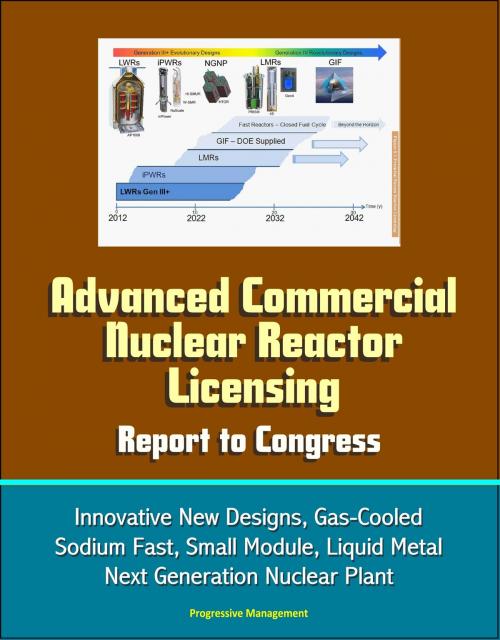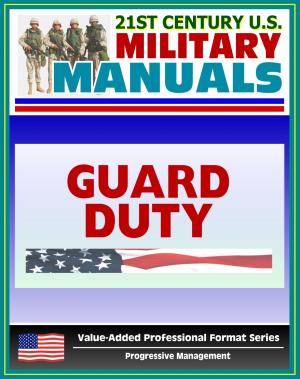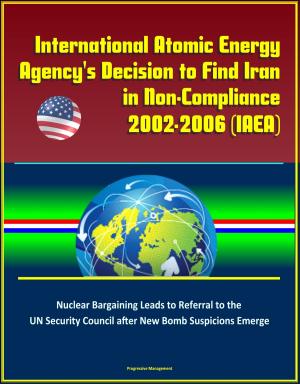Advanced Commercial Nuclear Reactor Licensing, Report to Congress: Innovative New Designs, Gas-Cooled, Sodium Fast, Small Module, Liquid Metal, Next Generation Nuclear Plant
Nonfiction, Science & Nature, Technology, Nuclear Energy| Author: | Progressive Management | ISBN: | 9781311922229 |
| Publisher: | Progressive Management | Publication: | June 25, 2014 |
| Imprint: | Smashwords Edition | Language: | English |
| Author: | Progressive Management |
| ISBN: | 9781311922229 |
| Publisher: | Progressive Management |
| Publication: | June 25, 2014 |
| Imprint: | Smashwords Edition |
| Language: | English |
This report, prepared in response to the Congressional request and follow-on discussions with Congressional staff, addresses the NRC's overall strategy for and approach to preparing for the licensing of advanced reactors. The report addresses licensing applications anticipated over the next 1 to 2 decades, as well as the potential licensing beyond twenty years. The report focuses on the licensing of nuclear reactor facilities for commercial use. Also, the report reflects the possibility that some number of the advanced reactor initiatives will evolve into licensing applications in order to illustrate potential regulatory challenges.
Regarding advanced reactors, the Commission expects, as a minimum, at least the same degree of protection of the environment and public health and safety and the common defense and security that is required for current generation light-water reactors [i.e., those licensed before 1997]. Furthermore, the Commission expects that advanced reactors will provide enhanced margins of safety and/or use simplified, inherent, passive, or other innovative means to accomplish their safety and security functions.
This policy was carried forward for applicability to the Generation reactor designs (i.e., LWR designs such as the AP1000 and the economic simplified boiling-water reactor (ESBWR)) and is communicated to all potential licensing applicants and stakeholders.
The NRC is conducting new reactor licensing activities, refining the processes for overseeing new reactor construction activities, and addressing the significant policy and technical issues related to the licensing of advanced reactor designs. The focus in 2012 and beyond is on completing the licensing activities for the design certifications and combined license applications now before the agency, expanding implementation of the construction inspection program to oversee construction as the combined licenses are issued, and beginning the review of applications for advanced reactor designs.
To facilitate the review of designs that differ from the large LWR facilities, the NRC is developing a regulatory approach that supports the unique aspects of advanced designs. This includes identifying and resolving policy, technical, and licensing issues; developing the regulatory strategies to support efficient and timely reviews; engaging the Department of Energy (DOE), designers, and potential applicants in meaningful preapplication interactions; and coordinating activities with internal and external stakeholders. One initiative NRC has undertaken to streamline its review of new applications involves integrating the use of risk insights to create design-specific review plans and standards for light-water small modular reactor (SMR) designs and the development, over the longer term, of a new risk-informed, performance-based regulatory structure for non-LWR advanced reactor designs. For awareness and insights regarding advanced reactor licensing in other countries, the NRC continues to be involved in the international nuclear community, as exemplified by the agency working closely with the International Atomic Energy Agency (IAEA) and regulators in other countries participating in the Multinational Design Evaluation Program (MDEP) and the Organization for Economic Cooperation and Development (OECD) Nuclear Energy Agency (NEA) Committee on Nuclear Regulatory Activities (CNRA) Working Group on the Regulation of New Reactors (WGRNR).
This report, prepared in response to the Congressional request and follow-on discussions with Congressional staff, addresses the NRC's overall strategy for and approach to preparing for the licensing of advanced reactors. The report addresses licensing applications anticipated over the next 1 to 2 decades, as well as the potential licensing beyond twenty years. The report focuses on the licensing of nuclear reactor facilities for commercial use. Also, the report reflects the possibility that some number of the advanced reactor initiatives will evolve into licensing applications in order to illustrate potential regulatory challenges.
Regarding advanced reactors, the Commission expects, as a minimum, at least the same degree of protection of the environment and public health and safety and the common defense and security that is required for current generation light-water reactors [i.e., those licensed before 1997]. Furthermore, the Commission expects that advanced reactors will provide enhanced margins of safety and/or use simplified, inherent, passive, or other innovative means to accomplish their safety and security functions.
This policy was carried forward for applicability to the Generation reactor designs (i.e., LWR designs such as the AP1000 and the economic simplified boiling-water reactor (ESBWR)) and is communicated to all potential licensing applicants and stakeholders.
The NRC is conducting new reactor licensing activities, refining the processes for overseeing new reactor construction activities, and addressing the significant policy and technical issues related to the licensing of advanced reactor designs. The focus in 2012 and beyond is on completing the licensing activities for the design certifications and combined license applications now before the agency, expanding implementation of the construction inspection program to oversee construction as the combined licenses are issued, and beginning the review of applications for advanced reactor designs.
To facilitate the review of designs that differ from the large LWR facilities, the NRC is developing a regulatory approach that supports the unique aspects of advanced designs. This includes identifying and resolving policy, technical, and licensing issues; developing the regulatory strategies to support efficient and timely reviews; engaging the Department of Energy (DOE), designers, and potential applicants in meaningful preapplication interactions; and coordinating activities with internal and external stakeholders. One initiative NRC has undertaken to streamline its review of new applications involves integrating the use of risk insights to create design-specific review plans and standards for light-water small modular reactor (SMR) designs and the development, over the longer term, of a new risk-informed, performance-based regulatory structure for non-LWR advanced reactor designs. For awareness and insights regarding advanced reactor licensing in other countries, the NRC continues to be involved in the international nuclear community, as exemplified by the agency working closely with the International Atomic Energy Agency (IAEA) and regulators in other countries participating in the Multinational Design Evaluation Program (MDEP) and the Organization for Economic Cooperation and Development (OECD) Nuclear Energy Agency (NEA) Committee on Nuclear Regulatory Activities (CNRA) Working Group on the Regulation of New Reactors (WGRNR).















